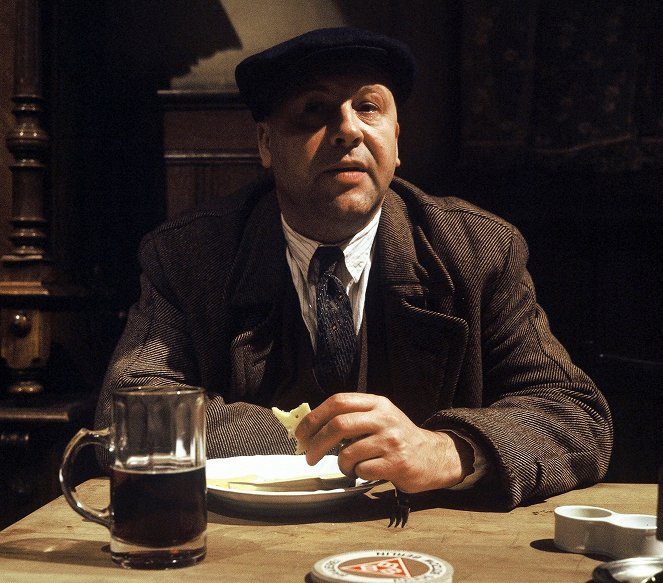Regie:
Rainer Werner FassbinderDrehbuch:
Rainer Werner FassbinderKamera:
Xaver SchwarzenbergerMusik:
Peer RabenBesetzung:
Günter Lamprecht, Karlheinz Braun, Hanna Schygulla, Claus Holm, Franz Buchrieser, Brigitte Mira, Roger Fritz, Gottfried John, Barbara Sukowa (mehr)Streaming (1)
Folgen(14)
-
Die Strafe beginnt (E01)
-
Wie soll man leben, wenn man nicht sterben will (E02)
-
Ein Hammer auf den Kopf kann die Seele verletzen (E03)
-
Eine Handvoll Menschen in der Tiefe der Stille (E04)
-
Ein Schnitter mit der Gewalt vom lieben Gott (E05)
-
Eine Liebe, das kostet immer viel (E06)
-
Merke: Einen Schwur kann man amputieren (E07)
-
Die Sonne wärmt die Haut, die sie manchmal verbrennt (E08)
-
Von den Ewigkeiten zwischen den Vielen und den Wenigen (E09)
-
Einsamkeit reißt auch in Mauern Risse des Irrsinns (E10)
-
Wissen ist Macht und Morgenstund hat Gold im Mund (E11)
-
Die Schlange in der Seele der Schlange (E12)
-
Das Äußere und das Innere und das Geheimnis der Angst vor dem Geheimnis (E13)
-
Mein Traum vom Traum des Franz Biberkopf von Alfred Döblin – Ein Epilog (E14)
Inhalte(1)
Berlin Alexanderplatz ist Rainer Werner Fassbinders Adaption des Klassikers von Alfred Döblin: Als Franz Biberkopf aus dem Gefängnis entlassen wird, schwört er, ein anständiges Leben zu führen. Er verdingt sich als Straßenverkäufer auf dem Berliner Alexanderplatz. Dann lernt er den Bandenchef Reinhold kennen und gerät auf die schiefe Bahn. Nach einem missglückten Einbruch verliert Franz einen Arm, aber nicht seinen Willen, für ein ehrliches Leben zu kämpfen. Er verliebt sich in die Prostituierte Mieze. Doch schon bald erscheinen die Phantome seiner Vergangenheit. (Verleiher-Text)
(mehr)Kritiken (3)
I won't give it five stars, because it is too intimate and literary, and you can still feel the scripted passages. But on the other hand, these are the strongest four stars you can imagine. Moreover, this series has not yet ended and it still resonates with me - it is an emotionally charged, cleverly filmed series with amazingly fleshed-out characters. Good, evil, love, and hatred... Such complicated, ambiguous characters only appear exceptionally. The series feels like a very cheap bar late at night, and that's part of its charm. It's a project that is better to watch with some time between each episode. Berlin Alexanderplatz is very, very good and I wouldn't rule out that it will appear on my list of favorite series. Overall impression: 85%.
()
Logischerweise basiert ein audiovisuelles Werk hauptsächlich auf dem visuellen Eindruck. Dieser besteht hauptsächlich aus der Qualität der Ausstattung, und wenn ich die ganze Zeit über nicht eine Minute daran geglaubt habe, werden die anderen Werte sofort ausgelöscht. In den 50er Jahren habe ich aufgehört, an einen guten deutschen Film zu glauben. Das ist das letzte Jahrzehnt, in dem ich hier und da noch etwas finden kann, aber sonst in großer Stückzahl nichts.
()
This review contains a spoiler. The only two people he truly loved were Mieze and Reinhold. As has been written elsewhere, Franz is a character that is broken, not only in time, but absolutely – he is constantly torn apart by the world, forced to always rebuild, to find himself again and forget what came before (first his right hand, eventually his soul, but he could not find that again). The greatness of this character lies in his love for Reinhold because that is the world - death - life itself, who has broken free from its commonality and stood in front of our protagonist personally - Reinhold is the embodiment of the world, one that is cruel and treacherous. The experienced Franz, who loves life and the world despite its endless injustices, embraces Reinhold in a gesture of a futile fight against the Unbeatable, which can be tricked exactly by not losing ourselves in love and the fight against it, not losing the will to love those close to us but also the World that enables us all this, even though it takes everything from us. That is precisely why the culmination is the ending of the 13th episode - Franz's laughter at the loss of Mieze is not cynicism, but the highest understanding - Mieze could not defeat Reinhold/Death, but she could lose herself because by denying Franz or leaving him, Reinhold would truly triumph. In the (one-armed) gesture of the embrace of Love and Death, the whole epilogue unfolds, which is an unprecedentedly perfect dialectical play of Death and Life, the guilt of the World before its own cruelty and the guilt of the Human-Franz before from own complicity. /// Without a doubt, Fassbinder created one of his best films, notable even within his filmography, primarily through the multi-layered content and form. The combination of the narrator, intertitles, and "poisonously sweet" music turns the epic of the story into an ironic and stinging poetry of sadness, life’s mistakes, turbulent times, and life itself.
()

